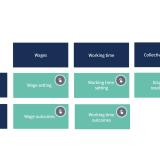Eurofound provides regular updates on pay in the EU, including an annual study on how minimum wage rates have developed across the EU (as well as Norway), reviewing how national governments and social partners engage in setting new rates. The Agency also looks at the concept of a living wage, aimed at guaranteeing workers and their families a decent level of living and social participation in response to the inadequacy of income for many working households reliant on existing national minimum wage rates.
Minimum wage developments
Eurofound’s annual review of minimum wages for 2025 is underway, with initial results published. The 2025 review includes a more detailed look at the question of how wage setters carry out their assessments of the adequacy of rates. Eurofound published a set of minimum wage country profiles in May 2024 which provide detailed background information on how minimum wages are set and regulated in the EU and Norway.
In an earlier study on pay in Europe in the 21st century, Eurofound explored the implications of a hypothetical scenario of a minimum wage coordinated at EU level and set at 60% of the median national wage.
Impact of COVID-19 for low-wage earners
The ongoing minimum wage debate is likely to be influenced by the COVID-19 pandemic and its aftermath, as many workers delivering essential services during the pandemic are those at the bottom of the pay ladder, while other low-wage workers were the first to be affected by unemployment. Eurofound’s e-survey on Living and Working in the EU documents the situation of European respondents and their post-pandemic concerns, including those on low incomes and those struggling to makes ends meet due to rising living costs. Minimum wages could play a policy role in stabilising incomes.
Pilot project on minimum wages
Following a request from the European Parliament and decision from the European Commission, Eurofound carried out a pilot project on the 'Role of the minimum wage in establishing the Universal Labour Guarantee' in the EU, running from 2021 to 2023. The project aim was to provide data and research evidence to feed into the monitoring of the Commission’s initiative on adequate minimum wages. Three distinct research modules covered the main objectives with specific outputs published for each.
Minimum wage versus living wage
A related but distinct concept to having a national minimum wage is that of a living wage, which is a wage designed to secure a basic but acceptable standard of living for its earner (and, in some cases, household dependents). Living wage campaigns are generally voluntary and rely on coalitions of interest groups, trade unions and employers working together. These campaigns can take on an advocacy role (Ireland) as well as an accreditation role (UK) where organisations are formally accredited as living wage employers. In line with the fair wage provisions set out in the European Pillar of Social Rights, Eurofound research aims to provide policymakers with a practical guide to the living wage concept.

























































